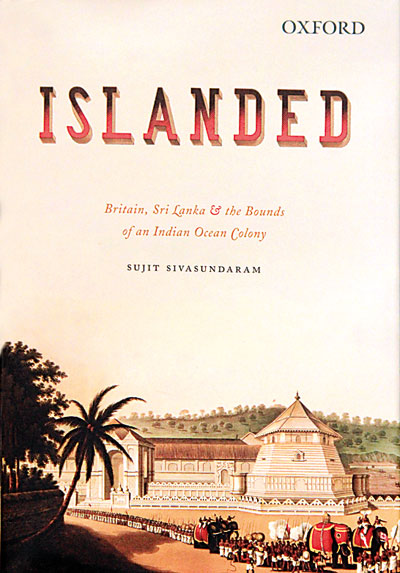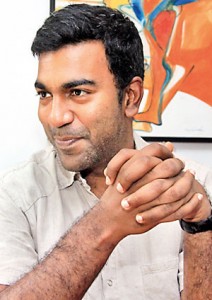Framing an island
View(s): In the chapter titled ‘Land’ in his book ‘Islanded – Britain, Sri Lanka & the Bounds of an Indian Ocean Colony’, Sujit Sivasundaram tells the rocky story of the building of the road to Kandy– the grand military road, as he calls it. Five years after the fall of Kandy, Governor Edward Barnes was of the view that a road to Kandy was the most crucial improvement necessary to secure the stability of Ceylon. The road would secure Britain’s military position in the interior.
In the chapter titled ‘Land’ in his book ‘Islanded – Britain, Sri Lanka & the Bounds of an Indian Ocean Colony’, Sujit Sivasundaram tells the rocky story of the building of the road to Kandy– the grand military road, as he calls it. Five years after the fall of Kandy, Governor Edward Barnes was of the view that a road to Kandy was the most crucial improvement necessary to secure the stability of Ceylon. The road would secure Britain’s military position in the interior.
But it turned out to be an exercise fraught with difficulty. Undertaken in the 1820s it was a huge project, requiring a lot of labour. There was resistance, attacks on the pioneers building the road.
That colonialism, was violent and aggressive is one aspect of the story, the author says, but the other aspect is that there are forms of resistance. People respond and they have the power to do so. Such resistance surfaces throughout ‘Islanded’ as he explores through chapters on Peoples, Trade, Scholars, Sites, Gardens, Land, Medicine and what he terms Publics how British rule impacted on so many spheres.
When he began his research, Sujit says he was looking at the relationship between knowledge and empire. “I talk about botany, medicine, geography and the various ways in which the British required knowledge to operate in this island and how they set about gathering this knowledge, institutionalising it in order to govern. Also what happened in the periods when the knowledge ran dry, when they didn’t know what was in the next province, what to do in a rebellion. What the local response was too – how the local people guarded their knowledge and how they resisted.
Yet despite the conflict, there was too that romanticised view of the island that the British had, of this ‘other Eden’, distinctly separate from the barren mainland and it is all these contradictions and dichotomies that his book seeks to bring out. ‘Islanded’ is compulsive reading for both the historian and the reader with an interest in seeing how the past has shaped this country, told in Sujit’s luminously elegant prose. The nature of imperialism and what empires do to societies and cultures unfolds in all its multi-dimensional forms. It took him ten years to write, ten years of painstaking research, unearthing voluminous files of colonial documents in the archives and libraries in Britain and Sri Lanka covering the end of the 18th century and the early 19th century, even low level correspondence between the officials and palm leaf manuscripts.
‘Islanded’ thus traverses the Dutch, British transition and focuses on how the British radically restructured the island. Sri Lanka was a strategic pivot in the Indian Ocean world. The Kandyan kingdom had long distance relations across the sea for religious, economic and cultural reasons before the advent of the British and was a cosmopolitan place. The British narrowed the position of the island; they made it a node of British Crown colonialism, distinct from India which was under the East India Company.
This act of distancing – of islanding and partitioning in the early 19th century meant that it served as a different space for forms of state making. “If one is South Asian, or British, you think of India as where it all happened so I was trying to see what the relationship is between the story in India and the story in Sri Lanka: the difference was that Sri Lanka was a Crown colony which India was not until after the Rebellion of 1857. So you have two very different structures, and two different institutions.” There can be a lot of irritation, as the rulers found because of the rivalry between the East India Company and the Crown in Ceylon.

Sujit Sivasundaram
“The island is also Buddhist – it is perceived as being different from the Hindu mainland and the indigenous people are Sinhalese- the Tamils are very recent arrivals. This is partly why the last King was sent back to India with all of these Malabars- the idea is that he is a native of India and a native of the East India Company. He’s the Company’s problem!” That institutional division he found interesting.
State making, Sujit argues, was much more intensive here. “As a small island you can see how the model works – you can deforest it, you can do plantations. It becomes a sort of laboratory for colonialism – for projects of intervention, for projects of plantation, for labour.”
Then came the idea of partitioning. While the partition of India has been extensively researched, less so the experience of other countries. Unlike in India, here the departure of the British was a peaceful transfer. Partitioning, was a process that runs over a period of time, he says, even then incomplete – and you could argue that was one of the ingredients that contributed to the instability.
Equally fascinating is his exploration of the legacy of Kandy. “You can’t just make a kingdom disappear- there are traditions, there are relationships between the state “and the Sangha which are then a framework for what the British do,” he says. The British were quick to take up the mantle of kingship, there are chronicles where the governors are extolled after the kings for their feats of building bridges and roads, the introduction of the railways, mail coaches and electricity. They are fulfilling the traditional functions of the Kandyan kings but there is a disconnect and that generates resistance.
Hopefully, he says the theories he puts forward will be revised and get richer with more interpretations and a better understanding of the past. History can’t solve the problems we have today, he adds. But it can perhaps prevent a type of politics which is ethnicised or makes very simple assertions about the state of the island and its past.
Now a Reader (a scholar who has attained international distinction in research) in World History at Cambridge University and Fellow of Gonville and Caius College, Cambridge, Colombo still figures large in Sujit’s life. Launching the South Asian edition of ‘Islanded’ here in December, he said it was a ‘coming home’ thanking his parents Ramola and Siva for the freedom they had given him to chart his own path. A formative influence in choosing to become a historian was being from a family of journalists on his mother’s side. ‘Islanded’ is dedicated to his grandmother Mano Muthu Krishna, a pioneering journalist who Sujit says has been an inspiration to him.
He recalls that as a boy, one of his greatest pleasures was wandering through his great grandfather Lawrie Muthu Krishna’s library. Lawrie Muthu Krishna was the visionary founder of the Polytechnic (less known is that he also started some newspapers) and the library at his home in Charlemont Road, was open to all his students. Another memory is of disposing of some of the unwanted old books by setting a table on the Galle Road one morning and selling them to passers-by!
But these early influences apart, that he would become a historian was something not envisioned. At St. Thomas Prep and doing his A/L’s at Colombo International School, he followed the approved path of a gifted student, winning a part scholarship to Cambridge University to study Engineering. Interestingly he says he hated history in his schooldays, taught as Social Studies with its emphasis on memorising. “Even now when my students ask me for dates, I say I’m not a historian who has dates precisely at his fingertips,” he smiles. What interests him is the human experience of the past, how cultures have developed and changed, how war and violence have happened in the past and still happen today.
He switched from engineering to history, thankful to a system that allowed such flexibility and went on to do a PhD in the History of Science which he describes, as a bit like a bridge- still about science but looking at the history of science and the history of knowledge. Initially a research fellow at Cambridge, he then became a lecturer and had a short stint at the London School of Economics lecturing on South Asian and Imperial History before returning to Cambridge. In 2012, he was awarded a Philip Leverhulme Prize for History and is currently the Sackler Caird Fellow, 2015-7, at the National Maritime Museum, Greenwich and a Councillor of the Royal Historical Society.
Hearing the lectures on the history of science, he sees as a turning point. “I just had some great lecturers. It was a very unusual subject – the emergence of science, how scientific theories have changed the world, the social context that produced such scientific knowledge, how do other considerations- political, religious, cultural impact on science. I guess my own research has been in that area. How science and imperialism have interacted and how the rise of science in the West has grown partly out of the knowledge they have got from the non-Europeans.”
His growing interest led him to a PhD that was on the Pacific looking at the relationship between science, imperialism and religion. The book was his first- published in 2005 ‘Nature and the Godly Empire: Science and Evangelical Mission in the Pacific -1795-1850’.
Amidst a hectic schedule of teaching and life with his young family – he and his wife Caroline have three children, he is already working on his next book commissioned by Harper Collins under the title ‘Revolutionary Empire’ where he explores how the British overtake and suppress the revolutionary culture ( the movement for rights, new constitutions etc) in the Indian Ocean and Pacific Ocean countries. “They come in and they take it over – (they say) we will protect, we will give you the rights you need and the laws you need, the right to practise religion. So that switch between the opening of a possibility to have a completely different future because of the revolutionary moment actually ends up with the opposite which is imperialism.
“I’m interested in that moment because it’s a moment in time when things could have gone a completely different way.”
It will focus on islands not much written about – Tasmania, Tonga, Mauritius and port cities like Cape Town and Singapore. Researching in these different places, he is deeply aware of how the past is ever present- “you can almost see some of the shadows of that history.”
He enjoys too the opportunities this brings to work with other academics and researchers, just like in ‘Islanded’ where so many generously shared their expertise – from the Peradeniya scholars to the Buddhist monks who helped him with the ola leaf manuscripts. “It’s always going to be collaborative. It’s something you do as a community, a collective enterprise and that’s quite fitting because it’s a contribution to human understanding.”
Islanded was first published in May 2013 by the Chicago University Press. The South Asian edition is published by the Oxford University Press. Priced at Rs. 2,900, the book is now available at local bookshops.
- Renuka Sadanandan


